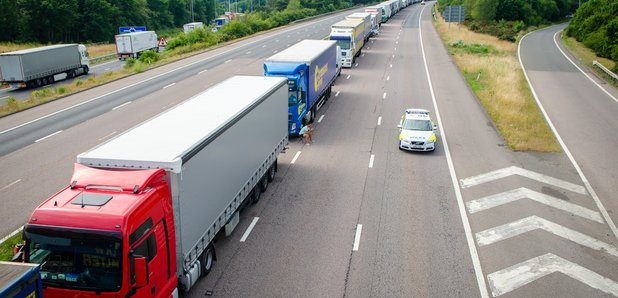£550 For Brext Rehearsal
8 January 2019, 00:00 | Updated: 8 January 2019, 11:44

Campaigners speak out after it is revealed the government has paid almost £50,000 to lorry drivers taking part in the exercise.
Plans by the government to utilise a disused airfield if there is disruption at the border in the event of a "no-deal" Brexit have been criticised, as a trial of the system got under way.
Conservative backbencher Charlie Elphicke, the MP for Dover, spoke out as almost 100 lorries descended on Manston airport.
The disused airfield, near Ramsgate in Kent, had its runway used as an HGV holding bay as a test in the event of problems caused by a disorderly exit from the EU.
And opponents of Brexit said the cost of the exercise showed that leaving the EU was "utter nonsense".
Congestion at the ports caused by customs checks being reintroduced on goods has been cited as among the likely negative effects of a no-deal withdrawal.
Operation Brock has seen lorries directed along the A256 towards Dover - a 20-mile journey that should take around 30 minutes.
Up to 150 lorries were initially expected to take part, but only 89 were actually involved, the Department for Transport confirmed.
Each driver participating in the exercise was paid £550, meaning the DfT shelled out a total of £48,950.
Mr Elphicke said the plan was "too complex" and would most probably cause "enormous confusion" for drivers.
In a series of posts on Twitter, he said: "Routing lorries via Manston is not the answer.
"Far better to extend the tried and tested traffic management system on the A20 at Dover to Kent's motorways.
"That way lorries can be effectively managed, got most speedily to the ports and all our motorways can be kept open.
"Manston should only be used as a last resort. Trying to explain to lorry drivers - many from overseas - to go there will be very difficult.
"The whole route plan is far too complex and will cause enormous confusion."
A DfT spokeswoman said the exercise was part of the "duty of a responsible government to continue to prepare for all eventualities and contingencies, including a possible no deal" and was aimed at ensuring the system is "fully functional" if needed.
A large convoy of lorries from regional and national haulage companies formed a queue on the runway around 7am on Monday.
The first practice run started at 8am, with four convoys leaving at intervals between 8.13am and 8.39am.






















